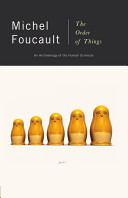Anthropologization
. 'Anthropologization' is the great internal threat to knowledge in our day. We are inclined to believe that man has emancipated himself from himself since his discovery that he is not at the centre of creation, nor in the middle of space, nor even, perhaps, the summit and culmination of life; but though man is no longer sovereign in the kingdom of the world, though he no longer reigns at the centre of being, the 'human sciences' are dangerous intermediaries in the space of knowledge. The truth of the matter is, however, that this very posture dooms them to an essential instability. What explains the difficulty of the 'human sciences', their precariousness, their uncertainty as sciences, their dangerous familiarity with philosophy, their ill-defined reliance upon other domains of knowledge, their perpetually secondary and derived character, and also their claim to universality, is not, as is often stated, the extreme density of their object; it is not the metaphysical status or the inerasable transcendence 'of this man they speak of, but rather the complexity of the epistemological configuration in which they find themselves placed, their constant relation to the three dimensions that give them their space.
Notes:
Folksonomies: perspective epistemology deconstruction
Taxonomies:
/finance/accounting and auditing (0.656195)
/society/unrest and war (0.264918)
/business and industrial/energy/oil (0.177962)
Keywords:
great internal threat (0.985428 (positive:0.581584)), ill-defined reliance (0.855403 (neutral:0.000000)), dangerous intermediaries (0.831308 (negative:-0.366419)), dangerous familiarity (0.829026 (neutral:0.000000)), essential instability (0.785883 (positive:0.612607)), epistemological configuration (0.774762 (neutral:0.000000)), inerasable transcendence (0.768686 (neutral:0.000000)), constant relation (0.754056 (neutral:0.000000)), extreme density (0.749839 (neutral:0.000000)), derived character (0.746880 (neutral:0.000000)), metaphysical status (0.739859 (neutral:0.000000)), man (0.512033 (neutral:0.000000)), sciences (0.510145 (neutral:0.000000)), space (0.508815 (negative:-0.414122)), Anthropologization (0.478315 (neutral:0.000000)), culmination (0.457945 (neutral:0.000000)), universality (0.437944 (neutral:0.000000)), centre (0.437549 (neutral:0.000000)), knowledge (0.413130 (negative:-0.366419)), posture (0.410600 (positive:0.612607)), uncertainty (0.409582 (neutral:0.000000)), difficulty (0.397799 (neutral:0.000000)), claim (0.391265 (neutral:0.000000)), summit (0.390979 (neutral:0.000000)), domains (0.390164 (neutral:0.000000)), dimensions (0.389124 (neutral:0.000000)), matter (0.385399 (neutral:0.000000)), truth (0.380287 (neutral:0.000000)), discovery (0.380035 (neutral:0.000000)), creation (0.379670 (neutral:0.000000))
Concepts:
Epistemology (0.961369): dbpedia | freebase | opencyc
Truth (0.940266): dbpedia | freebase
Philosophy (0.853766): dbpedia | freebase | opencyc
Metaphysics (0.830081): dbpedia | freebase | opencyc
Science (0.811756): dbpedia | freebase | opencyc
Physics (0.795169): dbpedia | freebase | opencyc
Scientific method (0.766264): dbpedia | freebase
Knowledge (0.707918): dbpedia | freebase





